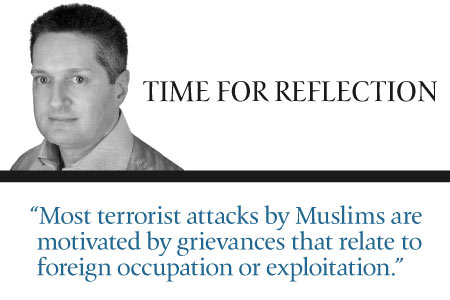
Time for Reflection
Issue 81 June 2011
Bin Laden’s death will not reduce terror threats, but a more positive western engagement with the Muslim world would.
President Obama trumpeted Osama bin Laden’s death as a long-overdue act of justice for the events of 9/11, and his punishment was overdue for that and other attacks by Al-Qaeda. Yet, we must not think the world has become safer. Only one week earlier, a bomb planted by an Al-Qaeda-inspired group tore through a café in Marrakesh, killing 16 tourists and wounding a score more. That indiscriminate bombing was only one of dozens that have killed men, women and children this year, just as hundreds of bombs have done every year for a decade. Their frequency will not decrease just because bin Laden—merely a totem for the desperately angry—is dead. Terrorism has become a bad habit for many people in the world.
Indiscriminate killing is un-Islamic. The Qur’an and Sunnah provide guidelines for just wars, which never include the deliberate harming of children, women, the elderly or even of combat-aged men who are not engaged in combat. I am well aware that terrorism is not unique even to mistaken Muslims. It occurs wherever people feel desperately grieved by oppression (or perceptions of it) or by immorality.
America’s second-worst terrorist attack occurred in 1995 when Timothy McVeigh killed 168 people and wounded 450 others. The dreadful Northern Irish “troubles” from the 1960s to the 1990s may seem like a painful memory. Yet the recent fatal bombing of a Catholic policeman in Omagh reminds us that sectarian grievances still exist in some minds and could motivate further violence.
Even suicide bombings, which have sadly become fashionable among some Muslims because of their “success” rate, are not unique to Muslims. Before they were violently defeated two years ago in a vicious state-led campaign, Sri Lanka’s Tamil Tigers were the world’s suicide bombers par excellence. And they, like Muslims, were motivated more by political rather than religious goals.
I am nonetheless saddened by the high number of Muslims attacking other Muslims, particularly in the Asian subcontinent. These bombings (often, but not always involving suicide) happen almost every week and usually involve Muslims angry at the state’s corruption and inadequacies, or at rival groups’ actions and “successes”. They tend to be perpetrated by young people with incomplete knowledge of the core teachings and values of our faith. Their victims are seldom soldiers or leaders, but are commonly women, children and men trying to live their lives in peace.
Their deaths do not often feature prominently in western media. A terrorist attack in Pakistan that kills a dozen people might be briefly mentioned by western media (although many such attacks are not), but certainly will not receive the prominence of, say, the recent bombing in Marrakesh. The death of westerners is more newsworthy in our media than that of Asians.
I do not think this is because western media believe the lives of westerners count for more. It is natural that western news agencies will want to report mainly on what happens to their citizens at home and abroad. Their reports, after all, are produced for local consumption. Yet, there is a negative consequence to this narrow focus. The western media’s emphasis on terrorist attacks against westerners perpetuates the myth and stereotype that Muslims hate the West and westerners. This is not true, in my view.
Eminent scholar Robert Pape demonstrates that most terrorist attacks by Muslims (and almost all suicide attacks, by whoever) are motivated by perceived grievances that relate to foreign occupation or exploitation. These include Palestinian attacks and most of those in Iraq and Afghanistan. Even many bombings in Pakistan relate to the government’s actions in support of the West’s counter-insurgency war in Afghanistan.
I reject the idea that innocent citizens can ever be targeted for the wrongs reportedly done by their governments. Yet it is also clear that western and other nations can increase their own security by leaving Muslim lands to carve out their own futures. Bin Laden may be gone, but some of the claimed grievances that he railed against—albeit through evil action—still fuel tremendous resentment.
I’m not a pessimist. One of the greatest joys I have right now is seeing Muslims rise up against tyranny, not as terrorists, but as democrats of a sort. The best thing we can do is stay out of the region and let them choose their future. They won’t choose what bin Laden wanted.
Dr Joel Hayward is Dean of the Royal Air Force College, and an author and poet. These are his personal views only.
Bookmark this |
|
Add to DIGG |
|
Add to del.icio.us |
|
Stumble this |
|
Share on Facebook |
|
Share this |
|
Send to a Friend |
|
Link to this |
|
Printer Friendly |
|
Print in plain text |
|


Comments
0 Comments